Cost Analysis: Budgeting for Concrete Driveway Installation
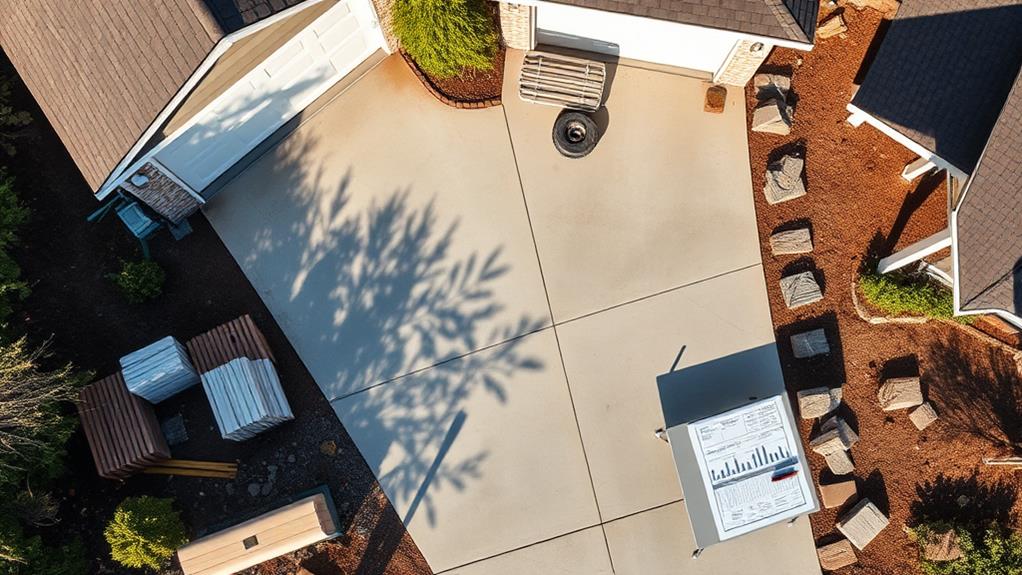
When you're considering a concrete driveway installation, you'll quickly realize that budgeting isn't as straightforward as you might think. The costs can vary widely, influenced by factors you may not have anticipated. From the quality of materials to the intricacies of your design, each element plays a vital role in determining your final investment. As you begin to explore your options, you'll find that understanding these cost factors is essential for making informed decisions. But what exactly are these factors, and how can you navigate them to guarantee you're getting the best value for your money?
Concrete Contractor Highlights
- Estimate costs between $4-$15 per square foot, with the national average at $6-$8 for basic installations.
- Factor in project complexity, material quality, labor rates, additional features, and regional variations when budgeting.
- Consider decorative enhancements, which can increase costs to $15-$30 per square foot for custom patterns or stamped designs.
- Account for site preparation, concrete thickness, and any necessary drainage systems or landscaping in the budget.
- Evaluate long-term value, including durability, low maintenance, and potential increase in property value when assessing costs.
Concrete Contractor Services Residential And Commercial
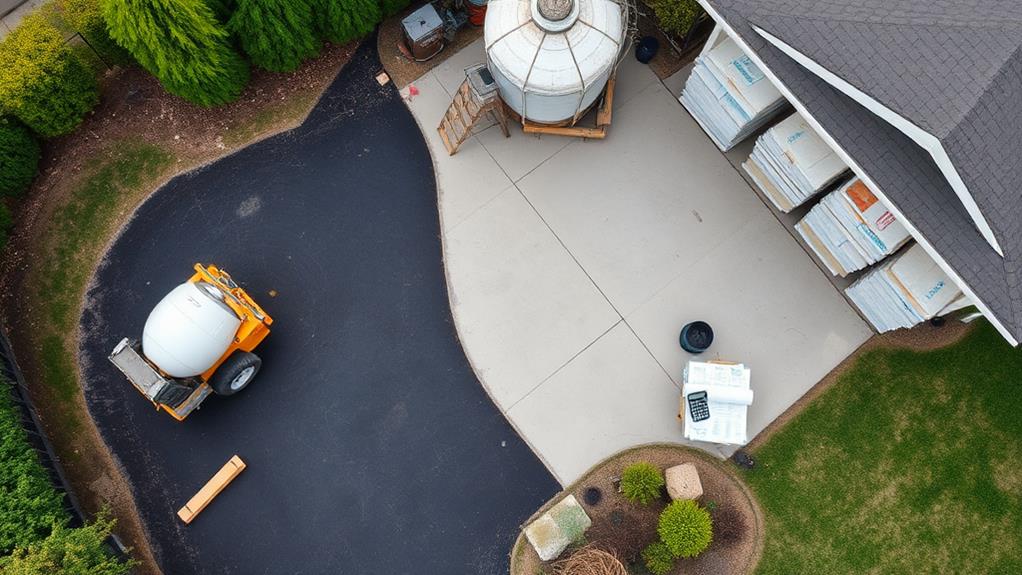
Our concrete contractor services cater to both residential and commercial clients, offering exhaustive solutions for all your concrete driveway installation needs. We specialize in designing, pouring, and finishing high-quality concrete driveways that enhance the curb appeal and functionality of your property.
With decades of experience, our team is extensively trained and certified in the latest concrete techniques to guarantee long-lasting results. Our experienced team utilizes state-of-the-art equipment and premium materials to assure durability and longevity.
From initial site preparation to the final finishing touches, we handle every aspect of the installation process with precision and care. Whether you're a homeowner looking to upgrade your residential driveway or a business owner in need of a robust commercial parking area, our skilled contractors can deliver customized solutions that meet your specific requirements and budget constraints.
Cost per Square Foot
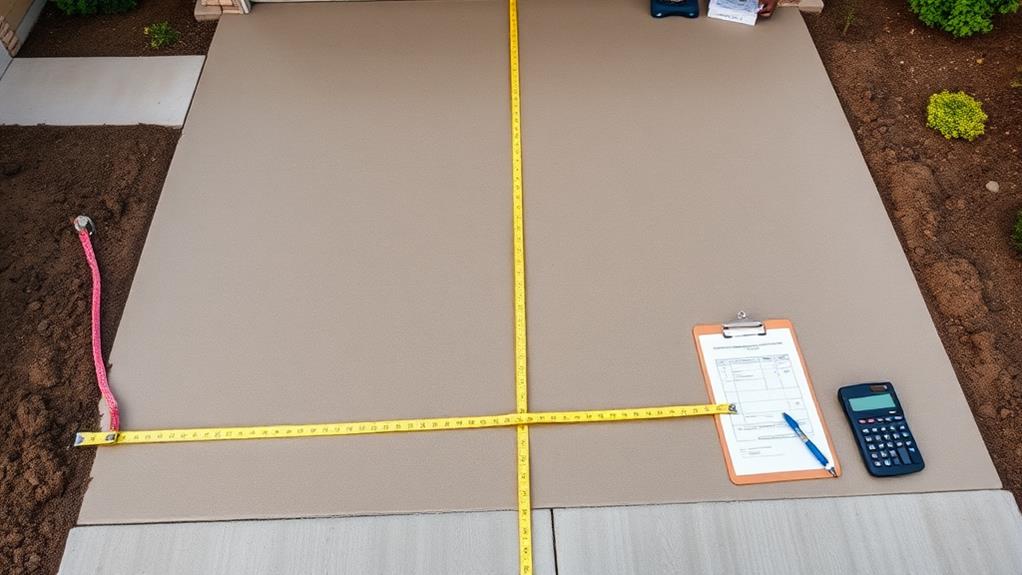
When budgeting for your concrete driveway installation, you'll find that costs typically range from $4 to $15 per square foot, depending on various factors. This range includes evaluations for the high-quality results delivered by experienced professionals in concrete services.
These factors include the complexity of the project, material quality, local labor rates, and any additional features or finishes you might choose. It's important to ponder that prices can fluctuate substantially between regions, with urban areas and locations with higher costs of living generally commanding higher rates for concrete driveway installation.
Typical Price Range
The typical price range for concrete driveway installation varies widely depending on several factors. You'll find that most homeowners spend between $4 and $15 per square foot, with the national average hovering around $6 to $8 per square foot. This range accounts for basic installations with standard finishes.
However, if you're looking to enhance your home's curb appeal with decorative elements or specialized concrete mixes, you might see prices climbing to $15 to $30 per square foot.
It's pivotal to understand that these figures aren't set in stone. Your specific project may fall outside this range due to unique site conditions, local labor costs, or material availability. For instance, if your property requires extensive grading or removal of an existing driveway, you'll likely face higher costs. Similarly, choosing stamped or colored concrete will increase your investment.
When budgeting, consider the long-term value a well-constructed concrete driveway adds to your property. While it may seem like a significant upfront cost, the durability and low maintenance of concrete often result in cost savings over time, making it a wise choice for many homeowners.
Factors Affecting Cost
Several key factors influence the cost per square foot of your concrete driveway installation. The size and shape of your driveway play a pivotal role, as larger or more complex designs require additional materials and labor. The thickness of the concrete slab, typically ranging from 4 to 6 inches, directly impacts the amount of concrete needed and, consequently, the overall cost. Your choice of finish, whether it's a standard broom finish or a more decorative option like stamped or exposed aggregate, will also affect the price.
The site's condition and preparation requirements can considerably impact costs. Factors such as soil type, drainage issues, and the need for excavation or grading will influence the final price. Additionally, your location and local market conditions play a role in determining labor and material costs. The accessibility of your property and any obstacles that may complicate the installation process, such as trees or existing structures, can also affect the price. Finally, any additional features you choose, such as reinforcement with rebar or wire mesh, color additives, or sealants, will contribute to the overall cost per square foot of your concrete driveway installation.
Regional Price Differences
Depending on where you live, the cost per square foot for concrete driveway installation can vary considerably. In urban areas with higher labor costs and stricter regulations, you'll typically find prices ranging from $8 to $15 per square foot. Conversely, rural regions may offer more competitive rates, often between $5 and $10 per square foot.
Coastal locations tend to have higher costs due to specialized concrete mixtures required to withstand salt exposure, potentially reaching $18 to $25 per square foot.
You'll notice that in the Northeast and West Coast, prices generally skew higher due to increased living expenses and material transportation costs. The Midwest and Southern states often present more affordable options, with some areas offering rates as low as $4 per square foot for basic installations.
It's important to remember that these regional differences reflect not only economic factors but also local climate conditions, soil types, and available resources. For instance, areas prone to freeze-thaw cycles may require additional reinforcement, increasing the overall cost. By understanding these regional variations, you can better anticipate and plan for the expenses associated with your concrete driveway project, ensuring you're well-prepared for the investment in your property.
Benefits
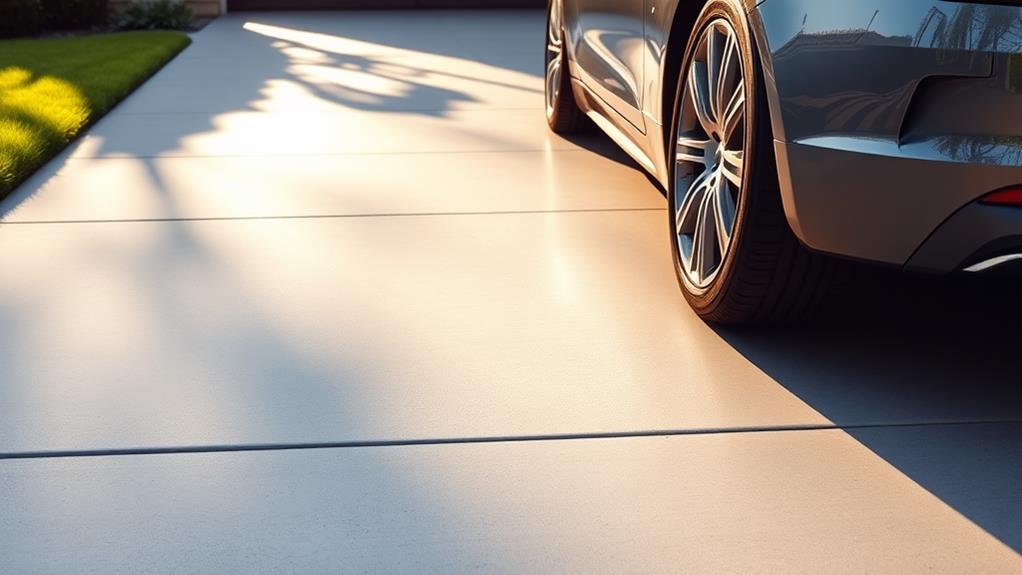
When considering a concrete driveway installation, you'll find several compelling benefits that extend beyond its primary function. For one, the durability of concrete drives makes them a long-term investment, often outlasting other materials like asphalt by several decades. Concrete driveways require minimal upkeep, eliminating the need for regular resealing or repaving.
A well-executed concrete driveway greatly / substantially / notably enhances your home's curb appeal and can potentially increase your property's value, making it an attractive investment for both present enjoyment and future returns. Additionally, concrete driveways offer low maintenance requirements and superior vehicle support, ensuring durability and longevity that can withstand the weight of multiple vehicles and various weather conditions for years to come.
Enhanced Curb Appeal
A concrete driveway makeover can markedly boost your home's curb appeal. When you invest in a well-designed concrete driveway, you're not just creating a functional space for parking; you're crafting an aesthetic focal point that enhances your property's overall appearance. The clean lines and smooth surface of a professionally installed concrete driveway create a polished look that complements your home's architecture and landscaping.
You'll find that a new concrete driveway can transform the entire front of your property, creating a cohesive and inviting entrance. The versatility of concrete allows for various finishes, colors, and patterns that can be tailored to match your home's style, whether it's modern, traditional, or somewhere in between. This customization guarantees that your driveway doesn't just blend in but actively contributes to your home's visual appeal.
Additionally, a well-maintained concrete driveway signals to neighbors and potential buyers that you take pride in your property's upkeep, potentially increasing its market value. By choosing concrete for your driveway, you're making a statement about your home's quality and your commitment to its long-term aesthetic appeal.
Increased Property Value
Installing a concrete driveway can substantially boost your property's value. When you invest in this home improvement project, you're not just enhancing your home's functionality; you're making a strategic decision that can yield significant returns. A well-designed and properly installed concrete driveway communicates to potential buyers that you've maintained and upgraded your property with care and attention to detail.
Real estate professionals often emphasize the importance of curb appeal in determining a home's market value. Your new concrete driveway will contribute to this paramount first impression, potentially setting your property apart from others in the neighborhood. Additionally, concrete's durability and low maintenance requirements are attractive selling points that can justify a higher asking price.
Consider the long-term financial benefits as well. Unlike asphalt or gravel alternatives, a concrete driveway's longevity means you won't need to budget for frequent replacements or extensive repairs. This cost-effectiveness over time translates to increased property value, as future owners won't have to factor in immediate driveway expenses. By choosing concrete, you're making a wise investment that not only serves your current needs but also positions your property favorably in the real estate market.
Low Maintenance Requirements
One of the most appealing aspects of a concrete driveway is its minimal upkeep requirements. When you invest in a concrete driveway, you're joining a community of homeowners who value long-term benefits and practicality.
Unlike gravel or asphalt surfaces that demand frequent attention, your concrete driveway will remain steadfast with only occasional care.
You'll find that maintaining your concrete driveway is a straightforward process. An annual power washing will suffice to remove accumulated dirt and stains, preserving its pristine appearance.
Sealing the surface every few years provides an additional layer of protection against weather elements and chemical spills, further extending its lifespan. In the rare event of minor cracks, they're easily addressable with concrete filler, a task you can often accomplish yourself without professional intervention.
The durability of concrete means you won't face the constant battle against weeds or the need for regular resurfacing that plagues other driveway materials. This low-maintenance characteristic not only saves you time but also reduces long-term costs associated with upkeep, making concrete an economically sound choice for your home's exterior.
Improved Vehicle Support
Strength and stability define the superior vehicle support offered by concrete driveways. When you invest in a concrete driveway, you're ensuring that your vehicles, regardless of their weight or size, will have a robust foundation to rest upon. The inherent durability of concrete allows it to withstand heavy loads without cracking or sinking, providing a level surface that will maintain its integrity for years to come.
You'll appreciate how concrete's uniform surface distributes weight evenly, preventing strain on your vehicle's suspension and tires. This is particularly beneficial if you own larger vehicles like SUVs, trucks, or RVs. The solid base also reduces the risk of tire punctures from loose gravel or debris, which is common with other driveway materials. In addition, concrete's resistance to oil and other automotive fluids means that any leaks or spills won't compromise the driveway's structural integrity.
This protection extends to extreme weather conditions; concrete's thermal mass helps regulate temperature, reducing the likelihood of ice formation in winter and excessive heat absorption in summer. By choosing a concrete driveway, you're not just improving your property's aesthetics; you're making a smart, long-term investment in vehicle care and safety.
Concrete Sealing and Maintenance Tips
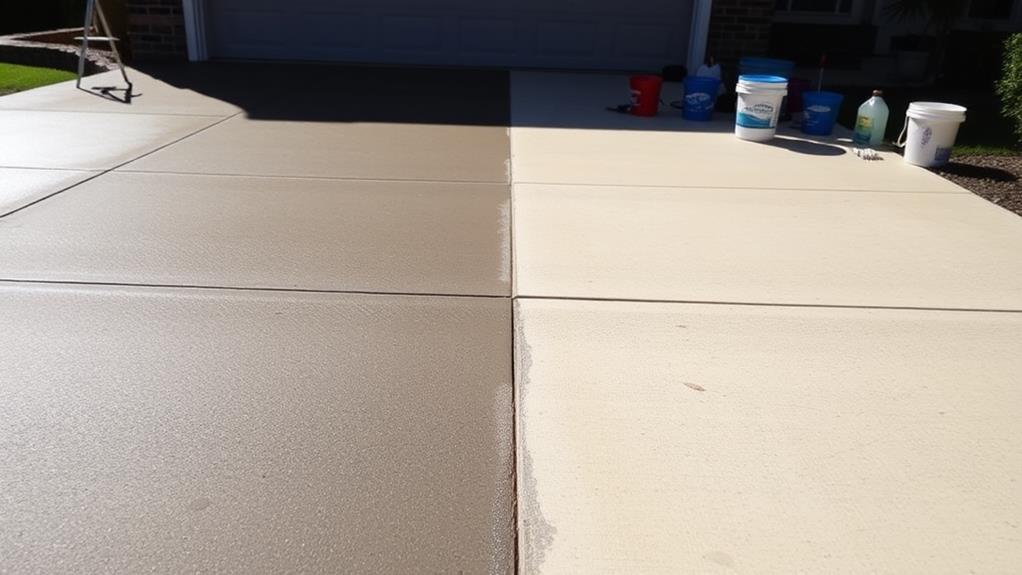
To maintain your concrete driveway's longevity and appearance, you'll need to implement a consistent sealing and maintenance routine. You should be aware of the ideal frequency and timing for sealing, employ proper cleaning techniques, and address any cracks promptly to prevent further damage. Consider the following table for a quick reference guide to concrete driveway maintenance:
| Task | Frequency | Importance |
|---|---|---|
| Sealing | Every 2-5 years | High |
| Cleaning | Monthly | Medium |
| Crack Repair | As needed | High |
| Degreasing | Quarterly | Medium |
Sealing Frequency and Timing
Determining the ideal frequency and timing for sealing your concrete driveway is central for maintaining its longevity and appearance. Generally, you should plan to seal your driveway every 2-5 years, depending on various factors such as climate, usage, and existing wear. In regions with harsh winters or frequent exposure to de-icing agents, you may need to seal more often, possibly every 1-2 years.
Conversely, in milder climates, you might extend the interval to 3-5 years. The most suitable time to seal your driveway is during dry, moderate weather conditions. Aim for temperatures between 50°F and 80°F, with low humidity and no rain forecasted for at least 24 hours after application.
Spring and fall typically offer ideal conditions, allowing the sealant to cure properly. Before sealing, ensure your driveway is thoroughly cleaned and any cracks or damage are repaired. This preparatory work is vital for the sealant's effectiveness and longevity. By adhering to a regular sealing schedule and choosing appropriate timing, you'll protect your investment, enhance your property's curb appeal, and potentially save on costly repairs in the future.
Proper Cleaning Techniques
When it comes to proper cleaning techniques for your concrete driveway, regular maintenance is key to guaranteeing the longevity and effectiveness of your sealant. Begin by sweeping the surface to remove loose debris, then use a pressure washer or garden hose with a high-pressure nozzle to thoroughly clean the concrete. For stubborn stains, apply a specialized concrete cleaner and scrub with a stiff-bristled brush. Rinse the surface thoroughly and allow it to dry completely before applying any treatments or sealants.
It's essential to address oil and grease stains promptly, as these can penetrate the concrete and weaken its structure. Use a degreaser specifically designed for concrete surfaces, following the manufacturer's instructions carefully. For organic stains like mold or mildew, a solution of water and bleach can be effective. Always test cleaning products on a small, inconspicuous area first to confirm they won't damage your driveway's finish. By incorporating these cleaning techniques into your regular maintenance routine, you'll protect your investment and maintain the aesthetic appeal of your concrete driveway for years to come.
Addressing Cracks Promptly
Regular cleaning is just one aspect of maintaining your concrete driveway; addressing cracks promptly is equally important. When you notice even the smallest fissures appearing in your driveway's surface, it's imperative to take immediate action. These seemingly insignificant imperfections can quickly escalate into more severe damage if left untreated, potentially compromising the integrity of your entire driveway.
To effectively address cracks, you'll need to first determine their severity. Hairline cracks, typically less than 1/8 inch wide, can often be remedied with a high-quality concrete crack filler. For larger cracks, you may need to employ a two-part epoxy or polyurethane injection system. It's of the utmost importance to thoroughly clean the affected area before applying any repair materials, ensuring proper adhesion and longevity of the fix.
In cases of extensive cracking or structural damage, it's advisable to consult with a professional concrete specialist who can assess the situation and recommend appropriate remediation techniques. By addressing cracks promptly and effectively, you're not only preserving the aesthetic appeal of your driveway but also safeguarding your investment and preventing more costly repairs down the line.
Concrete Contractor FAQ
How Long Does a Concrete Driveway Typically Last Before Needing Replacement?
Your concrete driveway can last 20-30 years with proper care. You'll love its durability! Regular maintenance like sealing and cleaning will keep it looking great. Remember, you're part of a community that values long-lasting home improvements.
Can I Install a Concrete Driveway Myself to Save Money?
You can install a concrete driveway yourself, but it's a challenging project. You'll need specialized skills and equipment. If you're up for the task, you'll save money, but consider the risks and time investment carefully before proceeding.
What Weather Conditions Are Ideal for Pouring a Concrete Driveway?
You'll want mild temperatures between 50-70°F for your concrete pour. Avoid rain or extreme heat. A calm, overcast day is perfect. You're joining many DIY enthusiasts who've successfully completed this project in ideal conditions.
Are There Eco-Friendly Alternatives to Traditional Concrete for Driveways?
You've got eco-friendly options! Try permeable pavers, which let water seep through, or recycled concrete aggregates. Grass pavers are great too. These alternatives reduce environmental impact and can make you feel part of the sustainability movement.
How Soon Can I Drive on a Newly Installed Concrete Driveway?
You'll want to wait before driving on your new concrete driveway. While you can walk on it after 24-48 hours, it's best to wait 7-10 days before parking your car. You're almost there!
